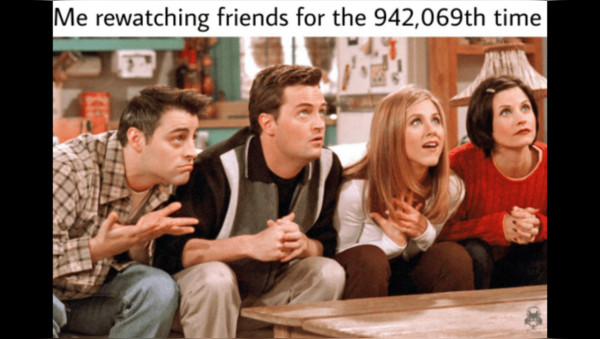How often do you find yourself hitting “play” on an old favourite, reliving the same TV episodes you’ve seen before – or even know by heart? I’m a chronic rewatcher. Episodes of sitcoms such as Blackadder (1983–89), Brooklyn Nine-Nine (2013–21), Doc Martin (2004–22) and The Office US (2005–13) – a literal lifetime of TV favourites – are usually dependable in times of stress.
But recently, ahead of an exceptionally challenging deadline, I found myself switching up my viewing. Instead of the escapist comedy I normally return to, I switched to Breaking Bad (2008–13), a nail-biting thriller with a complex reverse hero narrative – and immediately felt at ease.
What do our re-viewing choices tell us about ourselves? And is it OK that we keep returning to old favourites?
Although one-sided, the relationships we form with characters in our favourite TV shows can feel very real. They can increase a sense of belonging, reduce loneliness – and keep pulling us back in. When we rewatch, we feel sadness, wistful joy and longing, all at the same time. We call the sum of these contradictions nostalgia.
Originally coined in the 17th century to describe Swiss soldiers impaired by homesickness, psychologists now understand nostalgic reflection as a shield against anxiety and threat, promoting a sense of wellbeing. We all rely on fiction to transport us from our own lives and realities. Nostalgia viewing extends the experience, taking us somewhere we already know and love.
The Pandemic's Effect on Rewatching
The Covid-19 pandemic triggered a wave of nostalgia viewing. In the United States, audience analyst Nielsen found the most streamed show of 2020 was the American version of The Office, seven years after it ended its television run. A Radio Times survey found 64% of respondents said they had rewatched a TV series during lockdown, with 43% watching nostalgic shows.
We were suddenly thrown into an unfamiliar situation and in a perpetual state of unease. We had more time on our hands, but also wanted to feel safe. Tuning into familiar content on television offered an escape – a sanctuary from the realities of futures unknown.
Revisiting connections with TV characters gave us a sense of control. We knew what lay in their futures, and the calm and predictability of their arcs balanced the uncertainty in ours.
The Neuroscience of Nostalgia
The neuroscience of nostalgic experiences is clear. Nostalgia arises when current sensory data – like what you watch on TV – matches past emotions and experiences. It triggers a release of dopamine, a reward-system neurotransmitter involved in emotion and motivation.
So, nostalgia draws on experiences encoded in memory. The TV shows we choose to rewatch reflect our values, our tastes and the phases of life we have gone through. Perhaps this is a reason why reboots of our favourite shows sometimes fall flat, and ultimately set fans up for disappointment.
I still remember the crushing disillusion I felt while watching the sequel of the original Knight Rider series. I immediately turned to social media to find a community around my nostalgic setback.
Why 'Breaking Bad' Became My Go-To
Going back to my challenging deadline, what was it about the nostalgic experience of watching Breaking Bad that made it different? Breaking Bad evokes a particular phase in my life. I binged the first three seasons when writing up my PhD thesis. Walter White’s rise and fall journey towards redemption is enmeshed in the nostalgia of a difficult time I made it through.
The predictability of White’s arc on second viewing was an unlikely haven. Its escalating high-stakes drama mirrored my rising stress, while connecting me to who I was when I first enjoyed the show.
The result? “Dread mode” switched off – even as my anti-heroes marched again to their dire cinematic comeuppance. Reality, past and present, could be worse.
Nostalgia: A Comfort in Chaos
When the news cycle is grim and life feels a bit chaotic, do you find yourself switching on a tv series or movie you’ve seen a million times before to escape?
It’s that sweet predictability; jokes you know, scenes you love and characters like old friends. Sure there’s a mountain of new content to binge, but rewatching your old favourites could be doing your mental health wonders. Encountering nostalgia is like autoloading and hitting play on past positive experiences, elevating desire and regulating mood.
So next time you find yourself drawn back to a familiar TV show, remember it's not just a guilty pleasure; it's a valuable mental health tool. The next time you are feeling stressed, overwhelmed, or anxious, try revisiting a show from your past. It might just be the comfort you need to make it through.


















